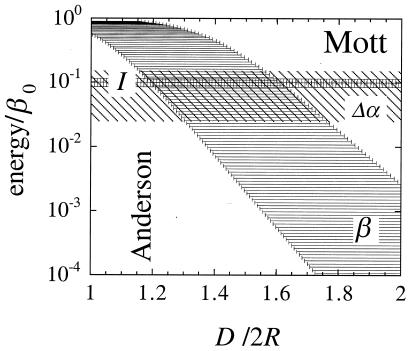Figure 1.
The three energies that determine the electronic structure and response of an array of nanodots, plotted vs. D/2R. D is the spacing of the dots in the array and the variable of the abscissa, and 2R is the diameter of the dots. Fluctuations in size and packing disorder, Δ(D/2R)/(D/2R) = ΔD/D + ΔR/R, make the values of the energies fluctuate. The coupling, β, of adjacent dots saturates when the dots nearly touch and then decreases exponentially with D/2R. The midpoint, D0, and the range of β have been previously determined (11) from the measured nonlinear optical response (5) of an array. The charging energy I is relatively small (hundreds to tens of meV), so it does not fluctuate by much. (I scales as 1/R, so ΔI = (ΔR/R)I). The fluctuations, Δα, in the energy of the dots can cover a wider range. The result is that for a wider size distribution, it can be the case that I ≤ Δα.

